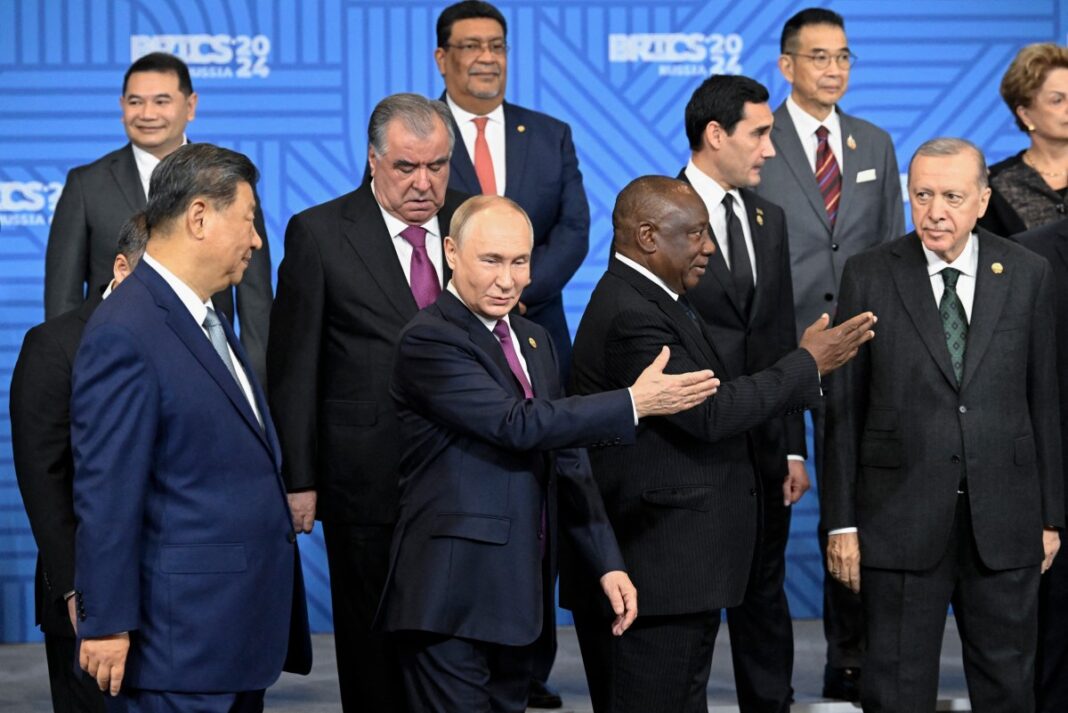China’s concerns about Turkey’s economy and Ankara’s approach to Beijing’s treatment of Uyghurs, along with India’s opposition to Turkey’s ties with Pakistan, have blocked Turkey’s full membership in BRICS, a Russia analyst said.
In a recent YouTube video, Russia analyst Dr. Kerim Has analyzed why Turkey’s bid for BRICS membership failed, discussing the future of Turkey-Russia relations and a recent meeting between Russian President Vladimir Putin and Turkish President Recep Tayyip Erdoğan.
Turkey’s expectation for full BRICS membership was not met at the summit in Kazan, Russia, held October 22-24, where it was instead granted “partner country” status along with Malaysia, Indonesia, Thailand and 13 other nations.
Reasons for failure to achieve membership
Has outlined three main reasons behind Turkey’s failed bid for BRICS membership.
First, BRICS is still working to integrate its four new members – Iran, the United Arab Emirates, Egypt and Ethiopia – who joined in early 2024.
Second, China has reservations about Turkey due to the Uyghur issue and concerns over Turkey’s economy. China sees Turkey as a possible burden on the BRICS Development Bank but also as a potential strategic asset within the Belt and Road Initiative, showing a cautious approach balancing economic and geopolitical interests.
The third and most significant factor, according to Has, is India’s opposition, largely due to Turkey’s historical alliance with Pakistan and its recent competition over arms supplies to Armenia in the South Caucasus. The region’s complex dynamics, including India’s strategic interests vis-à-vis Pakistan and China, influence India’s reluctance to support Turkey’s BRICS membership.
Shifts in relationship dynamics
According to Has, Turkey-Russia relations previously operated on an extremely asymmetric model that benefited Russia until the Ukraine war altered the balance.
This asymmetry, which was evident in the political, military and economic spheres, began to shift after Russia’s invasion of Ukraine.
Specifically, Russia’s reliance on Turkey as a “transit point” to sidestep Western sanctions has bolstered Turkey’s leverage, according to Has.
Russian fuel shipments, for example, were often rebranded and routed through Turkey before reaching Europe, enabling Russia to maintain its energy sales despite sanctions.
Nonetheless, Has notes that Turkey has not fully capitalized on this advantage, missing opportunities to enhance its negotiating power and strengthen economic ties.
Turkey-Russia relationship
Has points to three critical issues affecting Turkey-Russia relations.
The first is a reduction in trade volume, partly due to Turkey’s participation in some sanctions imposed on Russia by the G-7 and EU. Trade between the two countries dropped from $68–70 billion in 2022 to $55.4 billion in 2023.
This week, the Financial Times reported that Turkey blocked exports of about 40 categories of US military technology to Russia, which include dual-use items with both civilian and military applications, such as weapons system components.
The second issue involves disagreements over the gas hub project.
Putin proposed creating a new hub after the Nord Stream pipeline was damaged in 2022, but discussions now focus on an electronic trading platform instead of a physical gas storage site. Europe and the US are concerned the hub could enable Russia to bypass Western energy sanctions.
While Russia’s gas imports to Turkey dropped from 30 billion cubic meters to 20.5 billion cubic meters, Turkey has recently signed LNG agreements with ExxonMobil, Shell and Total. The TurkStream pipeline, a key route for Russian gas to southeastern Europe with a capacity of 31.5 billion cubic meters annually, reduces the urgency of establishing a new energy hub under current conditions.
The third issue is Turkey’s increased military support for Ukraine. Has notes that Putin is troubled by Turkey’s provision of Kirpi armored vehicles and ammunition, which have been deployed on Russian territory, particularly in the Kursk region. Turkish weaponry targeting Russian positions beyond Ukraine’s borders intensifies the challenges Turkey faces in balancing relations between its NATO allies and Russia.
Putin-Erdoğan meeting
A much-anticipated bilateral meeting between Putin and Erdoğan did not occur as planned at the summit.
Instead of a one-on-one, they held a 50-minute meeting with delegations, reflecting current bilateral tensions.
During the meeting it was announced that the Akkuyu Nuclear Power Plant would open in 2025 and that Russian tourist arrivals in Turkey increased 21 percent in 2023 to 6.3 million compared to the previous year, supporting Turkey’s tourism sector. Has explains that the repeated postponement of Putin’s visit to Turkey is mainly due to disagreements over the gas hub project.
Has predicts that developments in Syria will influence Turkey-Russia relations going forward. Turkey’s increased influence in northern Syria, including its normalization with Kurdish groups, could lead to more friction with Moscow, potentially impacting the regional power balance. As a result, Has expects continued fragility in Turkey-Russia relations.
